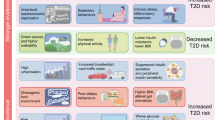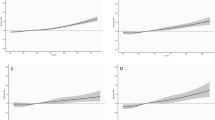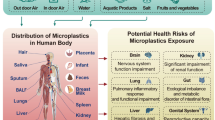Abstract
Purpose
To evaluate the confounding effects of passive smoking and COF exposure on association between tea and oral cancer in Chinese women.
Methods
A case–control study including 207 female oral cancer cases and 480 age-matched controls was performed in Fujian, China. Data were collected with a structured questionnaire by face-to-face interviews. The effects of tea consumption on oral cancer were, respectively, adjusted for Model-1 and Model-2 using logistic regression analysis. Model-1 did not adjusted for passive smoking and COF; Model-2 included the variables in Model-1, passive smoking and COF.
Results
Tea consumption was associated with a decreased risk of oral cancer in females: The OR was 0.498 (95 % CI 0.312–0.795) for Model-1 and 0.565 (95 % CI 0.352–0.907) for Model-2. The ORs for all the categories of tea consumption estimated by Model-2 were slightly higher than Model-1. When stratified by passive smoking, the statistically significant association between tea drinking and oral cancer was only emerged in non-passive smoking women. Stratification by COF found tea drinking was still associated with a decreased risk of oral cancer for women who have light-COF exposure, but an increased risk for those who subjected to heavy exposure. A negative, multiplicative interaction was found between tea consumption and COF exposure for oral cancer, but not found between tea consumption and passive smoking.
Conclusions
Tea consumption reduces the risk of oral cancer in Chinese women, but this effect is modified by the carcinogenic effects of passive smoking and COF exposure.

Similar content being viewed by others
References
Akaike H (1974) A new look at the statistical model identification. IEEE Trans Autom Control 19:716–723
Chang YC, Chen PN, Chu SC et al (2012) Black tea polyphenols reverse epithelial-to-mesenchymal transition and suppress cancer invasion and proteases in human oral cancer cells. J Agric Food Chem 60:8395–8403
Chen F, Cai L, He BC et al (2015) Effect of tea on oral cancer in nonsmokers and nondrinkers: a case–control study. Chin J Prev Med 49:683–687
Dossus L, Boutron-Ruault MC, Kaaks R et al (2014) Active and passive cigarette smoking and breast cancer risk: results from the EPIC cohort. Int J Cancer 134:1871–1888
Ferlay J, Soerjomataram I, Dikshit R et al (2015) Cancer incidence and mortality worldwide: sources, methods and major patterns in GLOBOCAN 2012. Int J Cancer 136:E359–E386
Franceschi S, Favero A, Conti E et al (1999) Food groups, oils and butter, and cancer of the oral cavity and pharynx. Br J Cancer 80:614–620
Freedman ND, Lacey JV Jr, Hollenbeck AR et al (2010) The association of menstrual and reproductive factors with upper gastrointestinal tract cancers in the NIH-AARP cohort. Cancer 116:1572–1581
Fu JY, Gao J, Zhang ZY et al (2013) Tea consumption and the risk of oral cancer incidence: a case–control study from China. Oral Oncol 49:918–922
Geleijnse JM, Witteman JC, Launer LJ et al (2000) Tea and coronary heart disease: protection through estrogen-like activity? Arch Intern Med 160:3328–3329
Ide R, Fujino Y, Hoshiyama Y et al (2007) A prospective study of green tea consumption and oral cancer incidence in Japan. Ann Epidemiol 17:821–826
Imai K, Suga K, Nakachi K (1997) Cancer-preventive effects of drinking green tea among a Japanese population. Prev Med 26:769–775
Johnson NW, Warnakulasuriya S, Gupta PC et al (2011) Global oral health inequalities in incidence and outcomes for oral cancer: causes and solutions. Adv Dent Res 23:237–246
Khan N, Afaq F, Saleem M et al (2006) Targeting multiple signaling pathways by green tea polyphenol (−)-epigallocatechin-3-gallate. Cancer Res 66:2500–2505
Kleihues P, Sobin LH (2000) World Health Organization classification of tumors. Cancer 88:2887
Koh YW, Choi EC, Kang SU et al (2011) Green tea (−)-epigallocatechin-3-gallate inhibits HGF-induced progression in oral cavity cancer through suppression of HGF/c-Met. J Nutr Biochem 22:1074–1083
Lee CH, Yang SF, Peng CY et al (2010) The precancerous effect of emitted cooking oil fumes on precursor lesions of cervical cancer. Int J Cancer 127:932–941
Radoi L, Paget-Bailly S, Menvielle G et al (2013) Tea and coffee consumption and risk of oral cavity cancer: results of a large population-based case–control study, the ICARE study. Cancer Epidemiol 37:284–289
Sisti JS, Hankinson SE, Caporaso NE et al (2015) Caffeine, coffee, and tea intake and urinary estrogens and estrogen metabolites in premenopausal women. Cancer Epidemiol Biomarkers Prev 24:1174–1183
Wang A, Kubo J, Luo J et al (2015) Active and passive smoking in relation to lung cancer incidence in the Women’s Health Initiative Observational Study prospective cohort. Ann Oncol 26:221–230
Wu AH, Arakawa K, Stanczyk FZ et al (2005) Tea and circulating estrogen levels in postmenopausal Chinese women in Singapore. Carcinogenesis 26:976–980
Xue X, Yin Z, Lu Y et al (2013) The joint effect of hOGG1, APE1, and ADPRT polymorphisms and cooking oil fumes on the risk of lung adenocarcinoma in Chinese non-smoking females. PloS ONE 8:e71157
Yang CS, Maliakal P, Meng X (2002) Inhibition of carcinogenesis by tea. Annu Rev Pharmacol Toxicol 42:25–54
Yang GH, Jason H, Yang Y et al (2011) Global Adult Tobacco Survey (GATS)—China 2010 Country Report. China Sanxia Press, Beijing
Zavras AI, Shanmugam P, Shetty D et al (2013) Oral and pharyngeal cancer in women. Dent Clin North Am 57:339–355
Zhang SK, Zheng R, Chen Q et al (2015) Oral cancer incidence and mortality in China, 2011. Chin J Cancer Res 27:44–51
Acknowledgments
This work was supported by grants from the Natural Science Foundation of China (Nos. 30771845 and 81172766), Natural Science Foundation of Fujian Province (No. 2015J01304), and the Scientific Research Program of Education Department of Fujian Province (No. JA13141). We are grateful to the subjects participated in the study. We thank The First Affiliated Hospital of Fujian Medical University for contributing to the collection of data.
Author information
Authors and Affiliations
Corresponding author
Ethics declarations
Conflict of interest
We declare that we have no conflict of interest.
Human and animal rights
The present study was approved by the Institutional Review Board (IRB) of Fujian Medical University, Fuzhou, China, and has been performed in line with the ethical standards laid down in the 1964 Declaration of Helsinki and its later amendments.
Informed consent
All subjects provided informed consent before being interviewed. Content mainly includes the purpose, contents, and methods of this study and confidentiality of research subjects. If participants agreed to accept investigation, they needed to sign the informed consent. Each participant had right to withdraw or decline from this study at any time.
Additional information
Fa Chen and Baochang He have contributed to the work equally.
Rights and permissions
About this article
Cite this article
Chen, F., He, B., Hu, Z. et al. Passive smoking and cooking oil fumes (COF) may modify the association between tea consumption and oral cancer in Chinese women. J Cancer Res Clin Oncol 142, 995–1001 (2016). https://doi.org/10.1007/s00432-016-2123-6
Received:
Accepted:
Published:
Issue Date:
DOI: https://doi.org/10.1007/s00432-016-2123-6




